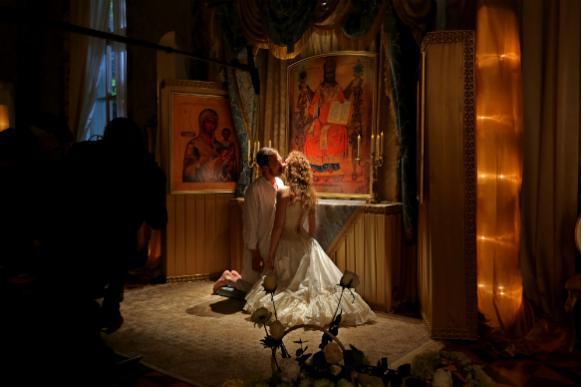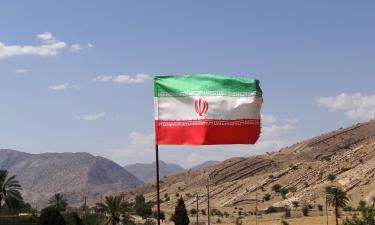Matilda: Unwanted controversial movie about last Russian emperor
Apparently, an official ban on the distribution of Alexei Uchitel's controversial motion picture "Matilda" will not be required. Russian cinemas and distribution networks refuse to play the movie because of threats of arson and other aggressive actions.

According to the most recent information, Russia's largest network of cinemas - the conglomerate of "Cinema Park" and "Formula of Cinema" (the network accounts for 612 cinema halls in 74 movie centres) decided to remove "Matilda" from their schedule. A press release from the company said that the decision was based on "unlawful actions on the part of opponents" of the film. According to experts, the decision will cut the planned box office by 20 percent.
Rumour has it that another large network - Karo Film - intends to make the same decision. The network administration allegedly asked law enforcement agencies to provide unprecedented security measures to let viewers watch "Matilda."
Several days ago, "Matilda" premiered in Vladivostok, the capital city of Russia's Far East. Predictably, the viewers were not shocked, but rather disappointed: the scope of the campaign against Uchitel's film suggested cinema-goers would see something absolutely shocking and outrageous. Shortly before the premiere, someone "mined" a local shopping centre. The premiere took place in Vladivostok, but was cancelled in Moscow, where spokespeople for Illusion Cinema referred to "technical reasons."
On the one hand, some women demand the makers of the Matilda trailer should be punished, because they promised them "to uncover the secret of the Romanovs' family." A relevant report was submitted to the St. Petersburg office of the Federal Arbitration Court of Russia.
On the other hand, some mentally unstable men drive UAZ vehicles loaded with fuel and gas cylinders into movie theatres (where, incidentally, Matilda was not shown).
The whole story is unfolding about the film, the production of which was coordinated at the Ministry for Culture. Natalya Poklonskaya, former prosecutor of the Crimea, currently an MP, drew public attention to the dark side of the film production finance. In response, Alexei Uchitel's lawyer asked competent authorities to look into Poklonskaya's accusations.
Natalia Poklonskaya has long been opposed to "Matilda" provoking unhealthy, if not sectarian, sentiments among Orthodox believers. In St. Petersburg, an attempt was made to set fire to the Lendok studio on August 31, where the creative team was working on the filming of Matilda. Cars were burned near the office of Alexei Uchitel's lawyer. In Yekaterinburg, the above-mentioned mentally unbalanced man rammed a minivan at a local cinema centre at about 5:00 a.m.
Poklonskaya refers to 100,000 signatures collected by supporters of the ban to show the film at Russian cinemas. After the arson incident in Omsk, the administration of the affected building decided to insure the property before the premiere of the scandalous motion picture.
At the same time, the hype about the film is devoid of any meaning. The financial side of the issue, that is, the allocating of funds for the shooting and the proper expenditure of money, is not directly related to the ban on the distribution of the film in Russia.
Writer and supporter of monarchy, Elena Chudinova, author of highly controversial books "The Mosque of Notre Dame" and "Winners," had this to say to Pravda.Ru on the subject:
"I was born in the USSR and I am against censorship. Everyone has the right to express their opinion! Yet, as a taxpayer, I have the right to demand that such filth should not be financed from the budget. One can not finance this! Let them make such films with their money and then show them in a small cinema! Orthodoxy is de facto our state religion. Why insult sanctity?"
"No matter how your opponents may try to slander the image of the last Russian emperor, this is completely pointless. Take the lives of saints. There are many saints, starting with Mary of Egypt, who could not be characterised as saints at first."
"But the tsar and his loved ones were murdered, they were stabbed with bayonets, their bodies were abused, but they could not destroy the memory of the last emperor. This memory still lives on!"
In a nutshell, the position of a well-known monarchist and public figure is as follows: one can not encroach on freedom of conscience by imposing bans.
Indeed, if we take a look at just a few Orthodox saints, including, for example, the saints of Equal-to-the-Apostles Constantine or Vladimir, St. Alexander Nevsky or St. Peter and Fevronia, we will see that before their glorification, many of them had had dark periods in their lives that contradicted to their subsequent worldview and their sanctification. The film by Alexei Uchitel does not touch upon the martyrdom of the last Russian emperor in prison and during his execution, the film neither defames nor disgraces the sanctity in any way. To crown it all, the film does not take away from the image of the Russian Tsar as a faithful and virtuous family man.
Reference: "Matilda" is a Russian historical drama film directed by Alexei Uchitel to be released on October 26, 2017. The film tells the story of a relationship between prima ballerina Matilda Kshesinskaya and Tsarevich Nikolai Alexandrovich (Nicholas II).
The film tells the story of the romantic relationship between the heir to the Russian throne, Nikolai (Nicholas) Romanov, and prima ballerina of the Imperial Theater, Matilda Kshesinskaya, from the moment when the 22-year-old crown prince and the 18-year-old dancer met for the first time in 1890 till the coronation of Nicholas II and his wife Alexandra Feodorovna in 1896.
The trailer to the film suggest that the plot of the film is based on the "love triangle" between Nicholas II, his wife and Matilda Kshesinskaya, in which Nicholas, before and after his marriage, dashes between the two women, Matilda and Alexandra, whereas the latter is portrayed as a vindictive and envious lady.
Alexander Artamonov
Pravda.Ru
Read article on the Russian version of Pravda.Ru
Subscribe to Pravda.Ru Telegram channel, Facebook, RSS!




